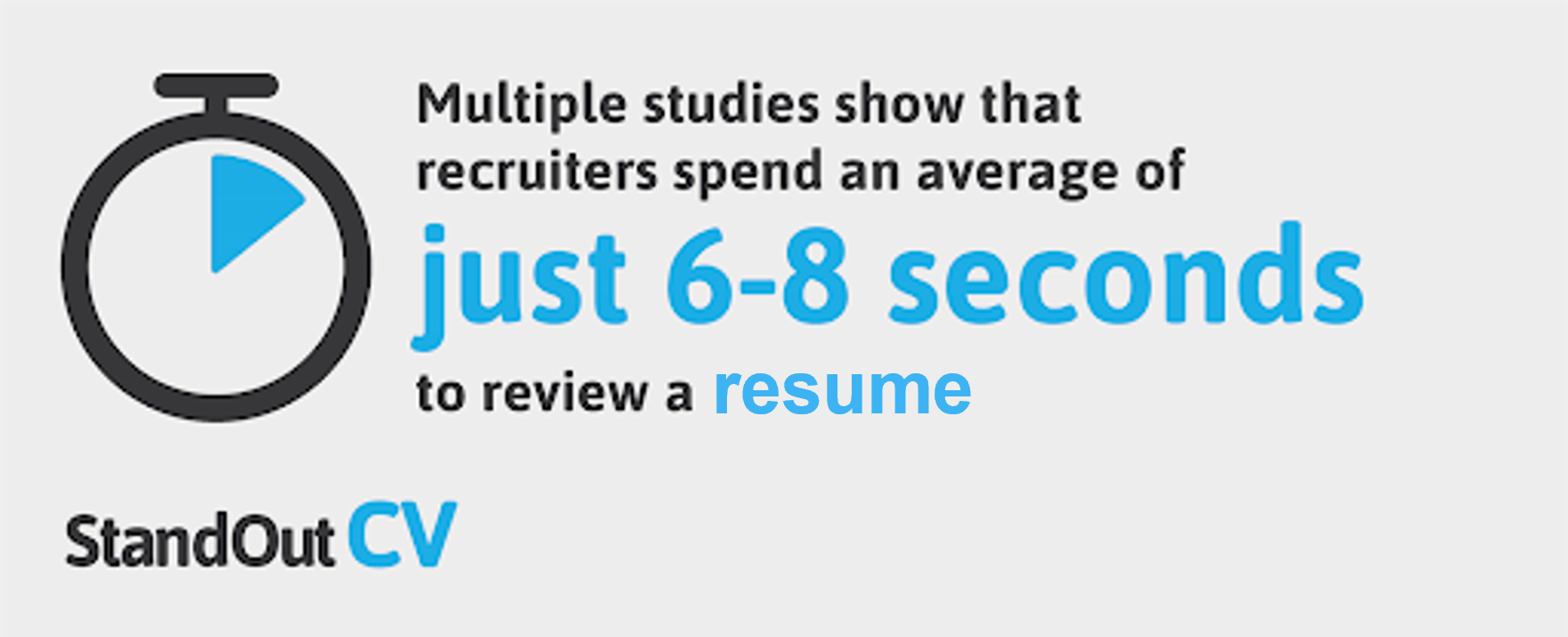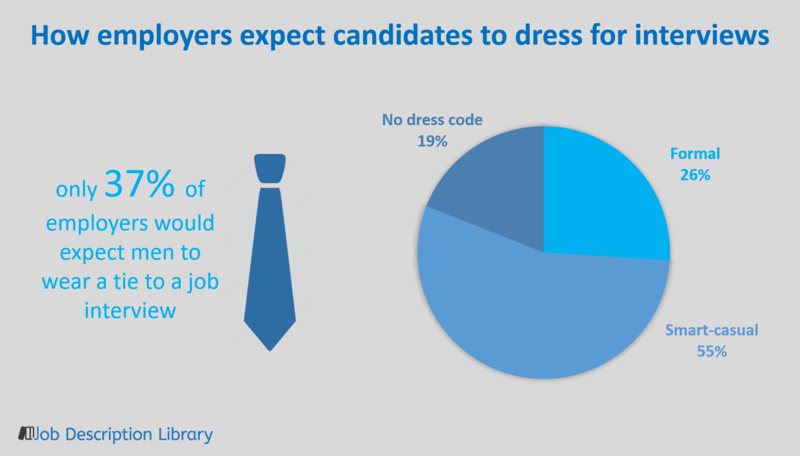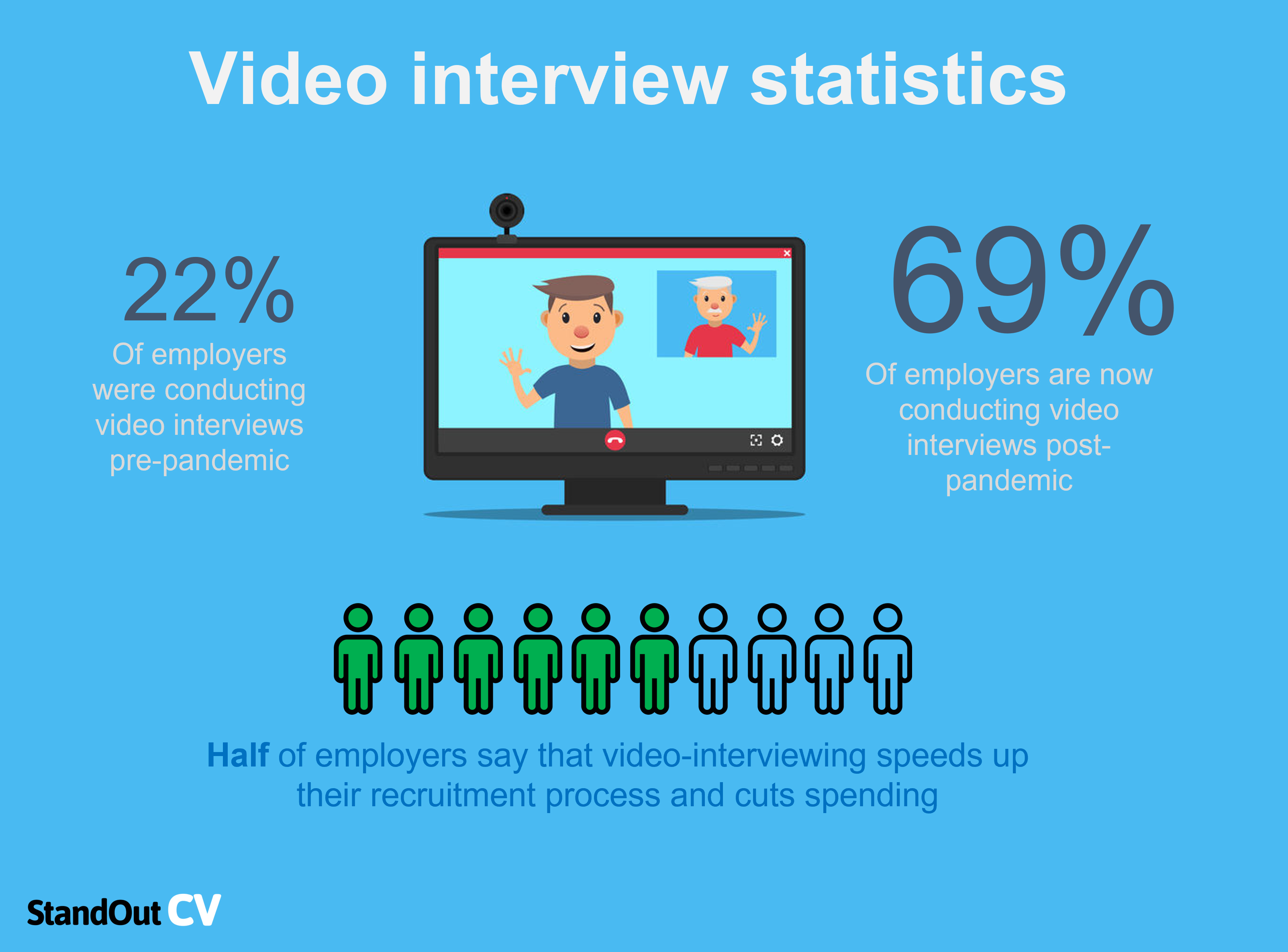The job interview is one of life’s most critical and potentially life-changing experiences.
But what are the facts and figures behind job interviews in the US?
We’ve scoured a huge range of reputable sources across the web to bring you the essential job interview statistics for 2023.
Contents
Key US job interview statistics 2023
- Only 2% of candidates who apply for a job are selected to attend a job interview.
- The average length of the interview process in the US is 23.8 days.
- It costs a candidate $72.29 to attend a job interview.
- Pre-pandemic, the average job interview was conducted face-to-face, post-pandemic it is now carried out by video-call.
- There has been a 57% increase in the use of video interviews from 2019 – 2023
- More than half of employers continue to use video interviews now that Covid restrictions are lifted.
- More than half of all candidates are rejected at the first interview stage.
- 30% of interviewers made their decision about a job seeker within the first five minutes of the interview.
- 93% of job seekers have experienced interview anxiety.
Getting a job interview
Securing an interview is the first hurdle in the job interview process – here’s how US candidates and employers are faring.
How many people apply for one job?
Forbes recently reported that the average job advertised receives 118 applications and 20% of those will make it through to interview stage. [1]
According to Glassdoor data, the average corporate job advert receives 250 resumes. [2]
How long do recruiters spend looking at resumes?
According to multiple studies, recruiters spend 6-8 seconds reviewing a resume before they decide whether it is suitable for a vacancy or not. Further reading.
How many candidates are selected for interview?
Glassdoor reports that only 1 candidate from every 50 applications is selected for interview, meaning only 2% of applicants get a job interview.
Applicants will receive an average of 8 rejections before successfully securing an interview, according to a recent survey of 1,000 job seekers featured in FastCompany [3]
Hiring managers will interview an average of 6 candidates for every 1 vacancy.
80% of resumes do not get shortlisted by recruiters, meaning they do not make it past the first screen.
How long does it take to get a job interview?
According to Career Sidekick it takes an average of 1-2 weeks to receive a job interview request after applying.
Only 5% of candidates secure an interview within 7 days of making an application.
Arranging and preparing for a job interview
Once a candidate secures an interview, here’s what happens before they arrive.
How do candidates travel to interviews?
57% of candidates take public transport to interviews, 39% drive, and 4% walk or cycle.
1 in 10 applicants think that employers should provide better instructions on finding the interview location.
7% of applicants have missed an interview due to commuting issues, such as train cancelations or traffic.
What is the cost of attending a job interview in the US?
A study conducted by Moneypenny Resources found that the average interview in the US costs the candidate $72.29.
This means that applicants facing a 3-stage interview will spend a total of $216.90
These expenses are broken down into;
- Loss of earnings for time away from current job
- Travel to interview
- Food and coffee
The most expensive US city to interview in is Colorado Springs with an average of $77.88 cost per interview – and the cheapest city to interview in is Oklahoma City at $60.31.
Do companies have to pay expenses for interview travel costs?
There are currently no federal or state laws stating that organizations are required to pay interview expenses to applying candidates. Sometimes companies will offer to pay for interview travel expenses, but these tends to happen at senior level such as CEO. [6]
What to take to a job interview
84% of interviewers expect candidates to bring a copy of their resume to the job interview.
Only 9% of interviewers would expect candidates to bring a copy of the job description.
2 in 10 employers would expect candidates to bring some form of presentation material.
What to wear to a job interview
Only 37% of employers would have expected men to wear a tie to a job interview.
26% of employers require a formal dress code for interviews, 55% require smart-casual, and 19% have no dress-code requirements at all.
More than half of candidates admit to being stressed out when choosing an outfit for a job interview.
Interview process statistics
What does a typical interview process look like, what stages are involved and how are they carried out?
How many people interview for one job?
In the US & Canada, employer organizations interview an average of 7 candidates per vacancy.
Globally the average number of interviews carried out by employers before they make a job offer is 17 – considering that many candidates will attend multiple interview stages.
How many stages in an interview process?
The average job interview process in the US consists of 2 interview stages.
Senior jobs usually have a minimum of 3 interview stages, and will always include at least one face-to-face interview.
Entry-level positions require only 1 interview stage.
Who do candidates meet in job interviews?
The average job interview is attended by 1 person from the employer.
2 in 10 interviews will be attended by more than one person from the employer.
On average a job applicant will meet 3 members of the employer’s staff, if they make it through the entire interview process.
How long does the job interview process last?
The average length of the hiring process in the US is 23.8 days according to Glassdoor data.
Washington DC has the longest hiring process at 33.2 days and Oklahoma City has the shortest with 17.9 days.
Jobs with longest hiring processes
| Job title | Average length of interview process (days) |
|---|---|
| Professor | 60.3 |
| Business systems analyst | 44.8 |
| Research scientist | 44.6 |
| Flight attendant | 43.6 |
| Communications specialist | 42.5 |
Jobs with shortest hiring processes
| Job title | Average length of interview process (days) |
|---|---|
| Waiter | 8 |
| Retail rep | 8.5 |
| Delivery driver | 8.5 |
| Brand Ambassador | 8.6 |
| Hair stylist | 9 |
How are job interviews conducted?
Pre-pandemic, the average job interview was conducted face-to-face, post-pandemic it is now carried out by video-call.
Pre-pandemic 79% of employers conducted first-stage interviews via telephone or face-to-face meeting. In 2023, video-interviews are the most popular method of conducting first-stage interviews with 86% of employers favoring it.
Pre-pandemic 94% of final interviews were carried out face-to-face, post pandemic this figure dropped to just 17%, but has since risen to 64% in 2023.
Where do job interviews take place?
88% of face-to-face interviews are carried out at the employer’s office, with 12% taking place in public meeting spaces such as coffee shops and restaurants.
How many candidates reach final interview?
39% of interviewing candidates make it through to the final interview stage. More than half of all candidates are rejected at the first interview stage.
Best companies to interview for
According to Glassdoor’s candidate reviews on interview process experience, these are the top 10 companies to interview for in the US.
| Position | Company | Industry | Interview Score |
|---|---|---|---|
| 1 | Sherwin Williams | Manufacturing | 0.88 |
| 2 | Grant Thornton | Finance | 0.87 |
| 3 | Caterpillar | Retail | 0.86 |
| 4 | BNY Mellon | Finance | 0.85 |
| 5 | J. Crew | Retail | 0.85 |
| 6 | H&R Block | Finance | 0.84 |
| 7 | Southwest Airlines | Aviation | 0.84 |
| 8 | Ernst & Young | Business Consultancy | 0.84 |
| 9 | Walt Disney | Entertainment | 0.83 |
| 10 | PwC | Business Consultancy | 0.83 |
What happens during job interviews?
What goes on inside job interviews, what is being discussed and why are candidates passing or failing interviews?
Job interview first impression statistics
Hirevue report that 30% of interviewers made their decision about an interviewee within the first five minutes of the interview. [10]
71% of employers say that visible tattoos on a candidate would put them off.
62% of employers say that a candidate’s dress sense will affect the hiring decision.
2 in 10 interviews go on for 30 minutes after the interviewer has already decided they will reject the candidate.
Interview lateness statistics
84% of interviewers regard lateness (without forewarning and explanation) as the worst interview offence possible.
67% of interviewers can forgive a candidate being late, if they call ahead to explain and offer a reasonable explanation.
60% of employers think that a candidate arriving more than 20 minutes early is a sign of poor time-keeping.
How long do job interviews last?
An average job interview will last between 30 – 45 minutes. Recruiters say that if an interview finishes in less than 20 minutes, it is a sign the interview has not gone well.
Roles in the IT sector have the longest interview duration with an average of 1 hour. Hospitality roles have the shortest interview lengths with an average of 15 – 30 minutes.
Why do candidates fail interviews?
The most common reason why a candidate would fail a job interview is a lack of understanding of the role – followed by lateness, poor people skills and dishonesty.
4 in 10 employers would reject a candidate if they showed no enthusiasm.
85% of employers would consider rudeness to be an instant reason for rejection.
More than half of interviewers have rejected an applicant for being “overqualified”
10% of hiring managers have rejected a candidate because they did not feel they were a good team fit.
What do recruiters look for in job interviews?
Employers expect candidates to know the following factors when they attend a job interview (in order of importance):
- What the job entails
- Why they are suitable for the job
- Basic details of the employer’s business
Conversely 78% of candidates say they find it difficult to find information about companies prior to interview.
Confidence was rated as the number one personality trait which recruiters look for in an interview.
Most common job interview questions
The most common job interview questions you should expect to hear in an interview are:
- Why do you want this job?
- Why are you leaving your current/previous job?
- Tell me about yourself
- Why should we hire you for this role?
- What do you hope to achieve in the first 3/6/12 months?
- What relevant experience do you have?
More than half of employers would not ask a candidate to discuss their weaknesses, and 100% of employers will ask candidates to explain a gap in employment if they spot one.
One in ten recruiters admit to asking candidates how old they are (this is against discrimination rules)
Interview nerves
According to a JDP survey 93% of candidates admit to experiencing job interview anxiety at some point in their career.
41% of candidates worry about not being able to answer a difficult question, and 20% worry about looking nervous during their interview.
A recent report featured on Inc magazine found that 73% of Americans think finding a job is one life’s most stressful experiences. [13]
Is salary discussed in interview?
91% of employers would expect candidates to know the salary on offer before attending an interview.
78% of candidates say that employers do not always make salaries clear during the application process.
Only 1 in 10 recruiters are not happy to discuss salary during a job interview.
Changing salary expectations at the final stage is cited as the most detrimental thing a candidate can do in remuneration discussions.
Video interview statistics
Due to lockdown restrictions in the US and across the globe, video interviews have seen a huge surge in popularity – but how are they being used, and are they here to stay?
How many companies carry out video interviews in 2023?
In 2023 69% of employers are incorporating video interviews into their hiring process.
Pre-pandemic 22% of employers incorporated video interviews into their interview process – as of January 2021, 79% were conducting video interviews regularly.
Overall there was a 67% increase in the use of video interviews from 2020 – 2021. [14]
At the end of 2022 video interviews had decreased by 10% from 2021, however this still represents a net increase of 57% from pre-pandemic times.
Are face-to-face interviews required after video interviews?
Less than half of employers still require a face-to-face interview in 2023 if the candidate passed the video interview stage.
For remote roles, 90% of employers would not require a face-to-face interview at all.
Do companies continue using video interviews after Covid?
Although most employers were forced to adopt video interviewing due to lockdown restrictions, more than half of employers continue to use them after restrictions have been lifted.
45% of recruiters say that video interviews help them to speed up their interview process and cut spending.
How do candidates feel about video interviews?
25% of candidates find video interviews more stressful than face-to-face interviews, citing the following reasons for disliking them:
- Finding it difficult to build rapport over video
- Worrying about internet connection dropping out
- Worrying about being judged on the condition of their home
7 in 10 candidates claim to have missed out on a job opportunity due to technology problems on a video interview.
1 in 10 candidates admit to carrying out a video interview from a current employer’s office without them knowing.
15% of candidates have had a video interview interrupted by someone they live with.
Post interview & job offers
What happens once the interview is over? How are candidates getting feedback, rejections and job offers?
Do recruiters always feedback to unsuccessful candidates?
98% of recruiters say that they always give feedback to unsuccessful candidates after an interview, yet 30% of candidates say that they have attended at least one interview from which they never heard back from the employer.
Candidates in the hospitality sector are least likely to hear back from a company after an interviewer.
How long after a job interview should you hear back?
The average time for employers to contact candidates after an interview is 12 days. 1 in 10 employers will take longer than 1 month to feedback to candidates.
Should candidates follow up after interviews?
27% of employers said that a post-interview thank you email would have a positive effect on a candidate’s job application, 61% said it would have no effect, and 12% said it could negatively affect the application.
The majority of employers would prefer a follow-up to be made via email.
How long after an interview is a job offer made?
On average it takes 3 weeks for an official job offer to be made in writing, from the day of the final interview.
A junior/entry-level job can be offered in less than 2 weeks, and senior jobs can take longer than 6 weeks to reach offer stage.
1 in 5 candidates have rejected a job offer because it took too long to arrive.
Sources
The research for this study was carried out in three phases.
The first was a survey of 102 hiring staff from a range of employers, whose jobs included hiring managers, internal recruiters and HR department members. We surveyed a mix of organizations across the full range of industries, and company sizes from 5 employees through to 50,000.
Secondly, we surveyed a group of 97 job seekers on their experiences with the job interview process – with a mix of junior level candidates and experienced workers across a mix of industries.
Update: in 2023 we surveyed the same group of employers and job seekers, with an 82% response rate.
Thirdly, we pulled together some of the most interesting US data from the following job interview research pieces below:
[1] Forbes – 7 Things You Probably Didn’t Know About Your Job Search: https://www.forbes.com/sites/jacquelynsmith/2013/04/17/7-things-you-probably-didnt-know-about-your-job-search/
[2] Glassdoor – Job and hiring trends: https://www.glassdoor.com/research/app/uploads/sites/2/2019/11/Job_Hiring_Trends_2020-FINAL-1-1.pdf
[3] FastCompany – This is how many rejections it takes before job seekers lose confidence: https://www.fastcompany.com/90763477/survey-how-many-rejections-job-seekers-lose-confidence-joblist
[4] Career Sidekick – How Long Does it Take to Hear Back After Applying for a Job?: https://careersidekick.com/hear-back-after-applying/
[5] Moneypenny Resources – What is the Cost of an Interview in the US?: https://www.moneypenny.com/us/resources/blog/what-is-the-cost-of-an-interview-in-the-us/
[6] The Balance – Do Companies Pay for Interview Travel Expenses?: https://www.thebalancemoney.com/do-companies-pay-for-interview-travel-expenses-2063008
[7] Forage – What to bring to a job interview: https://www.theforage.com/blog/basics/bring-job-interview
[8] Glassdoor – How Long Does it Take to Hire? Interview Duration in 25 Countries: https://www.glassdoor.com/research/time-to-hire-in-25-countries/
[9] Glassdoor – How Long Should Your Interview Process Take? We Found Out: https://www.glassdoor.com/blog/how-long-should-interviews-take
[10] HireVue – The Impact of First Impressions on Hiring: A Data Science Perspective: https://www.hirevue.com/blog/hiring/the-impact-of-first-impressions-on-hiring-a-data-science-perspective
[11] Business Insider – Best Companies to Interview for: https://www.businessinsider.com/best-companies-to-interview-with-2016-8
[12] JDP – How to prepare for interviews (survey): https://www.jdp.com/blog/how-to-prepare-for-interviews-2020/
[13] Inc magazine – Searching for a new job is stressful: https://www.inc.com/brian-de-haaff/73-percent-of-job-seekers-are-stressed-the-other-27-percent-are-likely-getting-all-second-interviews.html
[14] Personnel Today – Coronavirus recruitment report: https://www.personneltoday.com/hr/coronavirus-recruiter-reports-67-spike-in-video-interviews/






